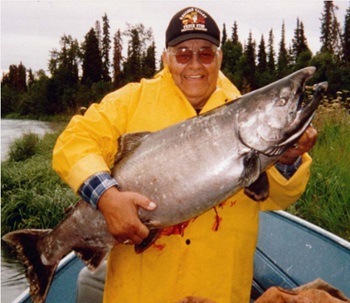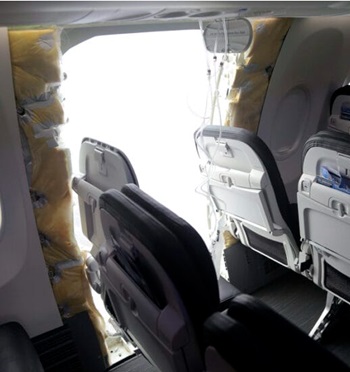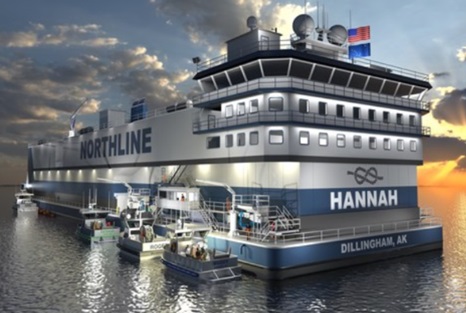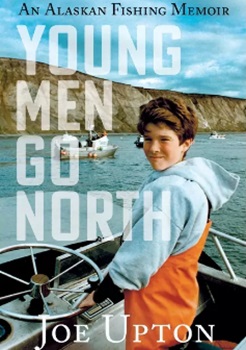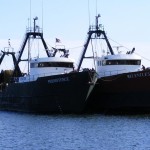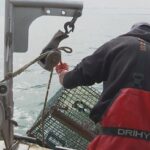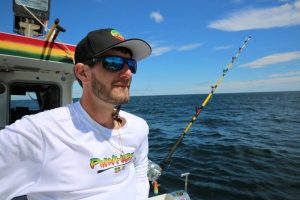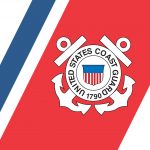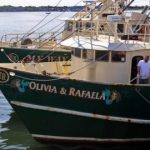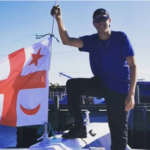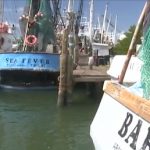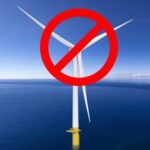Tag Archives: Alaska
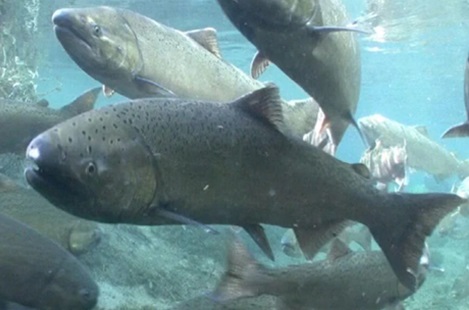
$20M+ in federal funds to California fisheries for disaster relief, $7M+ Oregon
More than $7,000,000 is going to Oregon fisheries as part of $42,000,000 in federal fishery disaster funding. Today, the U.S. Department of Commerce announced allocation of those funds for recovery from fishery disasters in Oregon, Alaska, California, Louisiana, Mississippi, and the Muckleshoot Indian Tribe and Yurok Tribe fisheries from 2017 to 2022. The federal funding will help ocean commercial fishermen in Oregon recover from significant economic losses in 2018, 2019, and 2020 from declining salmon populations. For California, U.S. Department of Commerce Secretary Gina Raimondo announced allocation of $20.6-million to address a fishery resource disaster that occurred in the 2023 Sacramento River Fall Chinook and Klamath River Fall Chinook Ocean and inland salmon fisheries. more, >>click to read<< 10:00
Trade groups and state unhappy with federal NOAA Fisheries management plan plan in public comments
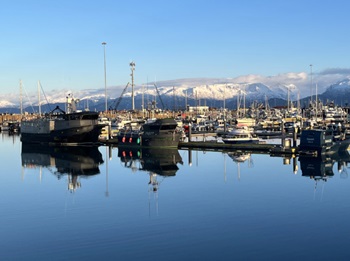 Public comment is in for a NOAA Fisheries management plan for Cook Inlet’s most productive drift fishing waters. In nearly 90 submitted public comments, cities, tribes, trade organizations and the state commissioner of Fish and Game express mixed and negative reactions to the plan. The Cook Inlet Exclusive Economic Zone, or EEZ, was the subject of a lawsuit by the United Cook Inlet Drift Association over management of the fishery, which starts three miles offshore and stretches from south 0 f Kalgin Island to Anchor Point. In response, the federal North Pacific Fishery Management Council closed the fishery in 2020, which was met with protest by Kenai Peninsula commercial fishermen. more, >>click to read<< 10:52
Public comment is in for a NOAA Fisheries management plan for Cook Inlet’s most productive drift fishing waters. In nearly 90 submitted public comments, cities, tribes, trade organizations and the state commissioner of Fish and Game express mixed and negative reactions to the plan. The Cook Inlet Exclusive Economic Zone, or EEZ, was the subject of a lawsuit by the United Cook Inlet Drift Association over management of the fishery, which starts three miles offshore and stretches from south 0 f Kalgin Island to Anchor Point. In response, the federal North Pacific Fishery Management Council closed the fishery in 2020, which was met with protest by Kenai Peninsula commercial fishermen. more, >>click to read<< 10:52
U.S. Department of Commerce allocates more than $42M in fishery disaster funding
 U.S. Secretary of Commerce Gina M. Raimondo announced today the allocation of more than $42 million to address fishery disasters that occurred in Alaska, California, Louisiana, Mississippi, Oregon and the Muckleshoot Indian Tribe and Yurok Tribe fisheries from 2017 to 2022. “Sustainable fisheries are essential to the health of our communities and support the nation’s economic well-being,” said Secretary Raimondo. “With these allocations, it is our hope that these funds help the affected communities and tribes recover from these disasters.” Today’s announcement applies to the following fishery disasters: Links, more, >>click to read<< 14:34
U.S. Secretary of Commerce Gina M. Raimondo announced today the allocation of more than $42 million to address fishery disasters that occurred in Alaska, California, Louisiana, Mississippi, Oregon and the Muckleshoot Indian Tribe and Yurok Tribe fisheries from 2017 to 2022. “Sustainable fisheries are essential to the health of our communities and support the nation’s economic well-being,” said Secretary Raimondo. “With these allocations, it is our hope that these funds help the affected communities and tribes recover from these disasters.” Today’s announcement applies to the following fishery disasters: Links, more, >>click to read<< 14:34
2023 was another bad year for chinook, fall chum salmon, Yukon River Panel hears
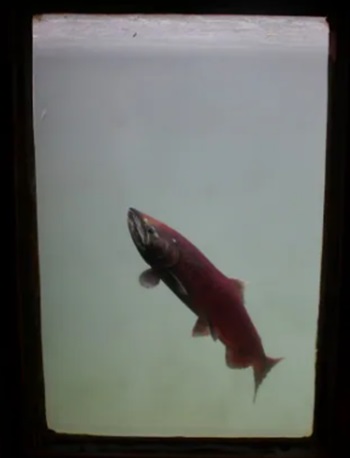 Alaska and Yukon representatives met in Whitehorse last week to discuss the 2023 chinook and fall chum salmon runs on the Yukon River, which once again failed to meet Canadian conservation goals. An estimated 58,529 chinook salmn entered the river last year, according to public presentations by the Alaska Department of Fish and Game, and Fisheries and Oceans Canada (DFO) during the Yukon River Panel’s post-season meeting. It was the second-smallest run on record — 2022 was the smallest — and not enough to meet spawning escapement goals on either side of the border. The goals set out the minimum range of fish that need to make it to their spawning areas to healthily sustain the population. more, >>click to read<< 13:51
Alaska and Yukon representatives met in Whitehorse last week to discuss the 2023 chinook and fall chum salmon runs on the Yukon River, which once again failed to meet Canadian conservation goals. An estimated 58,529 chinook salmn entered the river last year, according to public presentations by the Alaska Department of Fish and Game, and Fisheries and Oceans Canada (DFO) during the Yukon River Panel’s post-season meeting. It was the second-smallest run on record — 2022 was the smallest — and not enough to meet spawning escapement goals on either side of the border. The goals set out the minimum range of fish that need to make it to their spawning areas to healthily sustain the population. more, >>click to read<< 13:51
NOAA confirms 67 large whale entanglements nationally in 2022 – none involving the North Atlantic right whale
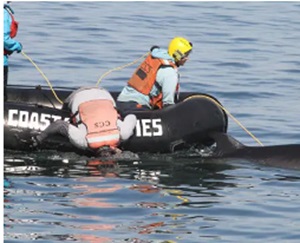 NOAA Fisheries has released the National Report on Large Whale Entanglements Confirmed in the United States in 2022. In 2022, there were 67 large whale entanglement cases – a slight decrease from 2021 and slightly below the historical average. The majority involved humpback whales and there were no confirmed entanglement cases with the endangered North Atlantic right whale. Over 85 percent of all confirmed live whale entanglement reports were observed off the coast of four states: California (34.3 percent), Massachusetts (20.9 percent), Alaska (14.9 percent) and Hawaii (14.9 percent). links, more, >>click to read<< 09:15
NOAA Fisheries has released the National Report on Large Whale Entanglements Confirmed in the United States in 2022. In 2022, there were 67 large whale entanglement cases – a slight decrease from 2021 and slightly below the historical average. The majority involved humpback whales and there were no confirmed entanglement cases with the endangered North Atlantic right whale. Over 85 percent of all confirmed live whale entanglement reports were observed off the coast of four states: California (34.3 percent), Massachusetts (20.9 percent), Alaska (14.9 percent) and Hawaii (14.9 percent). links, more, >>click to read<< 09:15
More boats sink, roofs collapse, avalanche danger remains high as snowfall pummels Juneau
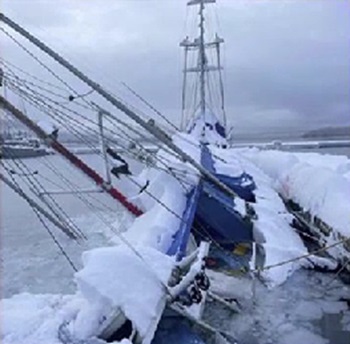 The City and Borough of Juneau put out a statement Wednesday that said avalanches have come down on Basin Road and above Behrends Avenue, the same spot where a slide occurred last week. A city official said that Basin Road is closed where it intersects with Eighth Street. Four boats sank in the city harbor early Wednesday morning, according to Juneau Harbormaster Matt Creswell, who said he is concerned more vessels are at risk of sinking due to the heavy snowfall. Creswell urged all boat owners to check on their boats immediately and clear off any snow they can. Juneau has seen over 28 inches of snow since Sunday alone and is up over 61 inches — or more than five feet — in the month of January. Video, photos, more, >>click to read<< 17:50
The City and Borough of Juneau put out a statement Wednesday that said avalanches have come down on Basin Road and above Behrends Avenue, the same spot where a slide occurred last week. A city official said that Basin Road is closed where it intersects with Eighth Street. Four boats sank in the city harbor early Wednesday morning, according to Juneau Harbormaster Matt Creswell, who said he is concerned more vessels are at risk of sinking due to the heavy snowfall. Creswell urged all boat owners to check on their boats immediately and clear off any snow they can. Juneau has seen over 28 inches of snow since Sunday alone and is up over 61 inches — or more than five feet — in the month of January. Video, photos, more, >>click to read<< 17:50
Petersburg Borough to join United Fisherman of Alaska
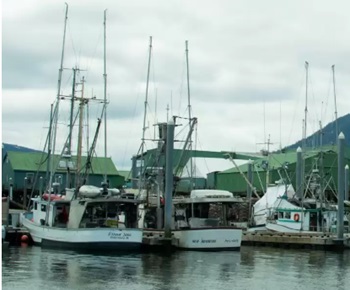 Petersburg will be the newest Community Supporting Member of the United Fishermen of Alaska, or UFA. That follows a unanimous vote by the Borough Assembly at their regular meeting last week. Vice Mayor Donna Marsh said she hopes the move will help boost the local fishing industry further down the line. “Commercial fishing is so integral to Petersburg,” said Marsh. “I think it would make sense to have the support of a professionally recognized organization [that is] also trying to keep that industry alive.” more, >>click to read<< 08:14
Petersburg will be the newest Community Supporting Member of the United Fishermen of Alaska, or UFA. That follows a unanimous vote by the Borough Assembly at their regular meeting last week. Vice Mayor Donna Marsh said she hopes the move will help boost the local fishing industry further down the line. “Commercial fishing is so integral to Petersburg,” said Marsh. “I think it would make sense to have the support of a professionally recognized organization [that is] also trying to keep that industry alive.” more, >>click to read<< 08:14
Coast Guard, good Samaritans rescue 4 people after fishing vessel capsized near Kodiak
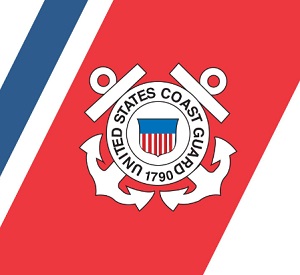 Coast Guard Sector Anchorage watchstanders received a report over VHF channel 16 at approximately 4:31p.m. from the crew of F/V Alaska Rose, a 46-foot fishing vessel, stating their vessel was taking on water. Watchstanders issued an urgent marine information broadcast on VHF channel 16 and launched a Coast Guard Air Station Kodiak MH-60 Jayhawk helicopter aircrew. The helicopter aircrew arrived on scene at approximately 4:56 p.m., located one person on the overturned vessel, hoisted them, and transferred them to Air Station Kodiak where they were met by local EMS. The crew of Good Samaritan vessel Kylia arrived on scene at approximately 5:02p.m., rescued three people from the water, and transferred them to Kodiak where they were met by local EMS. more, >>click to read<< 21:12
Coast Guard Sector Anchorage watchstanders received a report over VHF channel 16 at approximately 4:31p.m. from the crew of F/V Alaska Rose, a 46-foot fishing vessel, stating their vessel was taking on water. Watchstanders issued an urgent marine information broadcast on VHF channel 16 and launched a Coast Guard Air Station Kodiak MH-60 Jayhawk helicopter aircrew. The helicopter aircrew arrived on scene at approximately 4:56 p.m., located one person on the overturned vessel, hoisted them, and transferred them to Air Station Kodiak where they were met by local EMS. The crew of Good Samaritan vessel Kylia arrived on scene at approximately 5:02p.m., rescued three people from the water, and transferred them to Kodiak where they were met by local EMS. more, >>click to read<< 21:12
State sets much larger harvest guideline for Southeast golden king crab
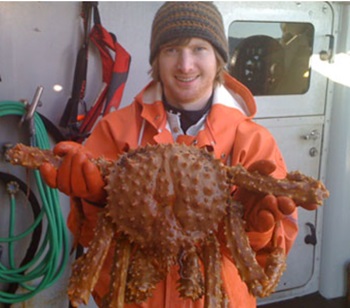 The commercial tanner crab and golden king crab season in Southeast opens at noon Feb 17. A change this year will require golden king crab fishermen to call in to the Department of Fish and Game every day to report which management area they plan to fish, to help fisheries staff better anticipate and manage the harvest. The department announced the golden king crab guideline harvest level in southern Southeast, Registration Area A, at 272,500 pounds, with specific areas seeing notable changes. The number is almost three times the size of last year’s guideline harvest, with most of the increase in a single portion of the region. The increase is the result of meetings between the fishing industry and state fisheries management. more, >>click to read<< 15:00
The commercial tanner crab and golden king crab season in Southeast opens at noon Feb 17. A change this year will require golden king crab fishermen to call in to the Department of Fish and Game every day to report which management area they plan to fish, to help fisheries staff better anticipate and manage the harvest. The department announced the golden king crab guideline harvest level in southern Southeast, Registration Area A, at 272,500 pounds, with specific areas seeing notable changes. The number is almost three times the size of last year’s guideline harvest, with most of the increase in a single portion of the region. The increase is the result of meetings between the fishing industry and state fisheries management. more, >>click to read<< 15:00
Bristol Bay Fishermen Celebrate Supreme Court Decision to Reject Alaska v. EPA
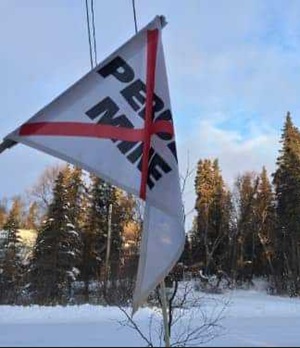 Monday, the United States Supreme Court announced their decision to reject the State of Alaska’s challenge of the Environmental Protection Agency’s (EPA) Clean Water Act veto of the proposed Pebble Mine. Commercial fishermen joined Bristol Bay Tribes and a majority of Alaskans in asking EPA to act to veto Pebble Mine over a decade ago. This protective action, finalized in January of 2023, ensured that Bristol Bay’s irreplaceable salmon runs – which sustain the people, culture as well as the foundation of a commercial fishing industry that generates more than $2 billion annually in economic output and supports more than 15,000 jobs – are not impacted by irresponsible open pit mining. more, >>click to read<< 14:05
Monday, the United States Supreme Court announced their decision to reject the State of Alaska’s challenge of the Environmental Protection Agency’s (EPA) Clean Water Act veto of the proposed Pebble Mine. Commercial fishermen joined Bristol Bay Tribes and a majority of Alaskans in asking EPA to act to veto Pebble Mine over a decade ago. This protective action, finalized in January of 2023, ensured that Bristol Bay’s irreplaceable salmon runs – which sustain the people, culture as well as the foundation of a commercial fishing industry that generates more than $2 billion annually in economic output and supports more than 15,000 jobs – are not impacted by irresponsible open pit mining. more, >>click to read<< 14:05
Photo Release: Coast Guard tows disabled fishing vessel to Adak, Alaska
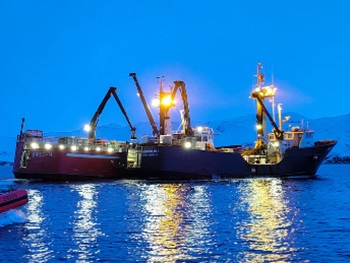 The crew of Coast Guard Cutter Alex Haley (WMEC 39) towed a disabled fishing vessel with eight people aboard to Adak, Monday. Alex Haley successfully towed the 127-foot fishing vessel Aleutian No. 1 into Adak and transferred to fishing vessel Erla-N. Erla-N then towed the disabled vessel into Adak where it was moored at the pier at 11:30 a.m. with the help of Alex Haley’s cutter boats. At 1:00 a.m. Saturday, the Alex Haley arrived on scene and took Aleutian No. 1 in tow before transiting over 160 miles to Adak. Watchstanders in the 17th District command center received initial notification from the master of Aleutian No. 1 at 5:57 a.m., Thursday, reporting they had fouled their prop, were unable to conduct repairs and were drifting approximately three miles north of Amchitka Island, 575 miles southwest of Dutch Harbor.3 photos, more, >>click to read<< 08:49
The crew of Coast Guard Cutter Alex Haley (WMEC 39) towed a disabled fishing vessel with eight people aboard to Adak, Monday. Alex Haley successfully towed the 127-foot fishing vessel Aleutian No. 1 into Adak and transferred to fishing vessel Erla-N. Erla-N then towed the disabled vessel into Adak where it was moored at the pier at 11:30 a.m. with the help of Alex Haley’s cutter boats. At 1:00 a.m. Saturday, the Alex Haley arrived on scene and took Aleutian No. 1 in tow before transiting over 160 miles to Adak. Watchstanders in the 17th District command center received initial notification from the master of Aleutian No. 1 at 5:57 a.m., Thursday, reporting they had fouled their prop, were unable to conduct repairs and were drifting approximately three miles north of Amchitka Island, 575 miles southwest of Dutch Harbor.3 photos, more, >>click to read<< 08:49
Bristol Bay’s 2023 year in review
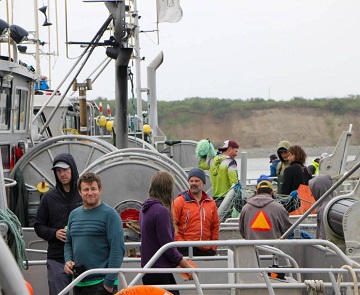 January started out with communities contending with an egg shortage, as an outbreak of avian flu in Washington state drastically slowed shipments north. Slavii stars circulated around the region for Orthodox Christmas with some precautions in place to protect community members from the flu virus and Covid-19. Dozens of people attended the Bristol Bay Native Corporation’s free online language classes in Yup’ik, Dena’ina and Alutiiq. The corporation also offered song and dance classes. And at the end of the month, many in Bristol Bay saw a years-long effort validated with the Environmental Protection Agency vetoing the controversial Pebble Mine project. Photos, more, >>click to read<< 12:35
January started out with communities contending with an egg shortage, as an outbreak of avian flu in Washington state drastically slowed shipments north. Slavii stars circulated around the region for Orthodox Christmas with some precautions in place to protect community members from the flu virus and Covid-19. Dozens of people attended the Bristol Bay Native Corporation’s free online language classes in Yup’ik, Dena’ina and Alutiiq. The corporation also offered song and dance classes. And at the end of the month, many in Bristol Bay saw a years-long effort validated with the Environmental Protection Agency vetoing the controversial Pebble Mine project. Photos, more, >>click to read<< 12:35
Ecosystem reports show continuing effects of warming in Alaska’s marine waters
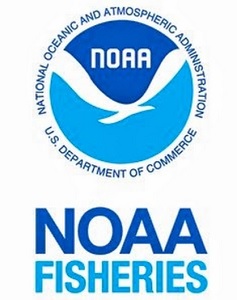 The waters off Alaska’s Aleutian Islands registered the warmest winter temperatures in over a century, part of a decade-long period of warming, according to a report issued by the National Oceanic and Atmospheric Administration. The Aleutians report is one of three annual ecosystem status reports issued by NOAA Fisheries for marine areas of Alaska. The reports, compiled by large teams of scientists, were released earlier this month and presented to the North Pacific Fishery Management Council, the panel that sets regulated commercial fishing in federal waters off Alaska. The Bering Sea remains warmer than the long-term average, though it has cooled since the heatwaves, NOAA Fisheries biologist Elizabeth Siddon told the North Pacific Fishery Management Council in her presentation of the report. more, >>click to read<< 07:53
The waters off Alaska’s Aleutian Islands registered the warmest winter temperatures in over a century, part of a decade-long period of warming, according to a report issued by the National Oceanic and Atmospheric Administration. The Aleutians report is one of three annual ecosystem status reports issued by NOAA Fisheries for marine areas of Alaska. The reports, compiled by large teams of scientists, were released earlier this month and presented to the North Pacific Fishery Management Council, the panel that sets regulated commercial fishing in federal waters off Alaska. The Bering Sea remains warmer than the long-term average, though it has cooled since the heatwaves, NOAA Fisheries biologist Elizabeth Siddon told the North Pacific Fishery Management Council in her presentation of the report. more, >>click to read<< 07:53
Fishermen and community leaders react to Trident announcement to sell a third of its Alaska plants
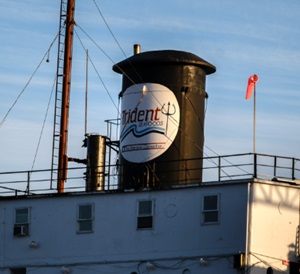 Gerry Cobban Knagin is a commercial fisherman. She and her family have fished around Kodiak and sold their harvest to Trident Seafoods, one of the largest seafood processors in the country, on and off for decades. But on Dec. 12, the company announced it’s selling off about a third of its Alaska processing plants, including their year-round facility in Kodiak. She said the announcement was a huge shock for almost everyone on the island. “Speaking with [Trident] management, there wasn’t any heads up for anyone,” Knagin said. “And they decided, according to management, that they wanted full transparency so that the fleet would know.” Photos, more, >>click to read<< 20:44
Gerry Cobban Knagin is a commercial fisherman. She and her family have fished around Kodiak and sold their harvest to Trident Seafoods, one of the largest seafood processors in the country, on and off for decades. But on Dec. 12, the company announced it’s selling off about a third of its Alaska processing plants, including their year-round facility in Kodiak. She said the announcement was a huge shock for almost everyone on the island. “Speaking with [Trident] management, there wasn’t any heads up for anyone,” Knagin said. “And they decided, according to management, that they wanted full transparency so that the fleet would know.” Photos, more, >>click to read<< 20:44
Trident Seafoods announces plan to streamline, modernize operations
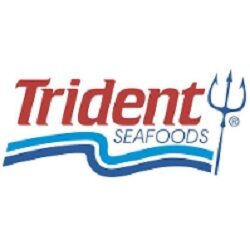 Trident Seafoods, a corporate giant among North American seafood processors, is looking for potential buyers for four of its shoreside plants in Alaska as part of a restructuring plan announced on Tuesday from its headquarters in Seattle. Such bold action is necessary to deliver fair value to fleet, communities and all stakeholders into the future, said Joe Bundrant, CEO of the company built by his father, Chuck Bundrant, starting more than 50 years ago with a single fishing vessel. Bundrant said he remains confident overall of the Alaska seafood industry and Trident’s role in it. He acknowledged these significant changes and said the company is focused on treating its impacted employees and communities with the respect and compassion they deserve. more, >>click to read<< 13:43
Trident Seafoods, a corporate giant among North American seafood processors, is looking for potential buyers for four of its shoreside plants in Alaska as part of a restructuring plan announced on Tuesday from its headquarters in Seattle. Such bold action is necessary to deliver fair value to fleet, communities and all stakeholders into the future, said Joe Bundrant, CEO of the company built by his father, Chuck Bundrant, starting more than 50 years ago with a single fishing vessel. Bundrant said he remains confident overall of the Alaska seafood industry and Trident’s role in it. He acknowledged these significant changes and said the company is focused on treating its impacted employees and communities with the respect and compassion they deserve. more, >>click to read<< 13:43
Fisheries in Focus: How the mystery of the great eastern Bering Sea snow crab die-off was solved
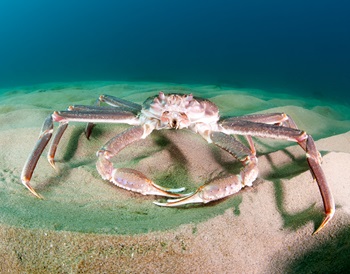 A 2018 National Marine Fisheries Service survey estimated the eastern Bering Sea snow crabs population at 11 billion crabs, the highest amount ever recorded. Three years later, the population crashed by more than 90 percent, closing the fishery for the first time in its history (it remains closed). Where did all the snow crab go? What caused their disappearance? Did they move elsewhere? Did they die? Alaska fishery management is regarded as the best in the world – was this management error? Two years ago, we published an interview with Cody Szuwalski, a researcher at NOAA and lead investigator on the snow crab collapse, speculating on what happened. Now, we have answers: A team of scientists seemed to have solved the mystery this fall with a paper published in Science, Szuwalski et al. 2023. They concluded that the crabs died from a warm water anomaly that sped up their metabolisms. In short, there wasn’t enough food to go around – they starved. more, >>click to read<< 06:05
A 2018 National Marine Fisheries Service survey estimated the eastern Bering Sea snow crabs population at 11 billion crabs, the highest amount ever recorded. Three years later, the population crashed by more than 90 percent, closing the fishery for the first time in its history (it remains closed). Where did all the snow crab go? What caused their disappearance? Did they move elsewhere? Did they die? Alaska fishery management is regarded as the best in the world – was this management error? Two years ago, we published an interview with Cody Szuwalski, a researcher at NOAA and lead investigator on the snow crab collapse, speculating on what happened. Now, we have answers: A team of scientists seemed to have solved the mystery this fall with a paper published in Science, Szuwalski et al. 2023. They concluded that the crabs died from a warm water anomaly that sped up their metabolisms. In short, there wasn’t enough food to go around – they starved. more, >>click to read<< 06:05
‘Freaked out’: Big money industry crippling salmon population in Alaska, natives say
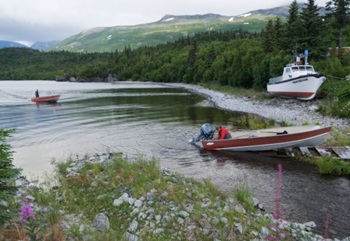 There is no more salmon. That’s what native Alaskan Ricko DeWilde is most concerned with these days. Once flowing with abundance, native tribes have been sounding the alarm about the overfishing of Alaskan Ricko DeWilde and other native fish by international fishing companies, essentially wiping out natives’ main source of food as well as a cultural touchstone. “That’s a way of life that we’re losing right there,” DeWilde said. “Any of the fishing along the Yukon River has been prohibited,” DeWilde said. “The commercial fishing industry is just running rampant out here and it’s big money. They take over to board of fish, they take over to politicians, they have them in their pocket and it becomes like a fish mafia out here.” photos, >>click to read<< 08:08
There is no more salmon. That’s what native Alaskan Ricko DeWilde is most concerned with these days. Once flowing with abundance, native tribes have been sounding the alarm about the overfishing of Alaskan Ricko DeWilde and other native fish by international fishing companies, essentially wiping out natives’ main source of food as well as a cultural touchstone. “That’s a way of life that we’re losing right there,” DeWilde said. “Any of the fishing along the Yukon River has been prohibited,” DeWilde said. “The commercial fishing industry is just running rampant out here and it’s big money. They take over to board of fish, they take over to politicians, they have them in their pocket and it becomes like a fish mafia out here.” photos, >>click to read<< 08:08
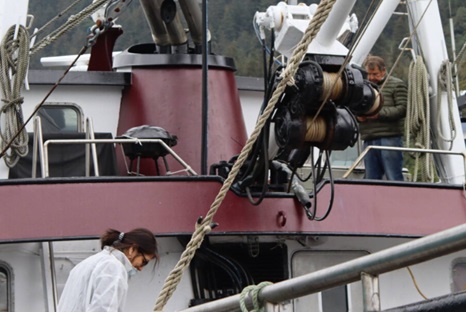
Commercial crab fishery closed for 2023-2024 season
The Alaska Department of Fish and Game has closed the commercial red and blue king crab fishery for the 2023-2024 season, the sixth year in a row, citing stock survey numbers that remain well below the regulatory threshold. The survey estimated 119,000 pounds of legal male red king crab are available for harvest, significantly below the 200,000 pounds required to open the commercial fishery, said Adam Messmer, lead king/tanner crab biologist for ADFG. While that’s an improvement from last year, where the survey estimated 95,000 pounds, improvement does not mean they are a harvestable size, Messmer said. “If they would open up the crab season for 10-15 days it would help bail us out of a terrible season,” said Norval Nelson, owner and operator of Star of the Sea, which was in Aurora Harbor. He made his comments before he learned of the news. more, >>click to read<< 18:24
NOAA Fisheries releases more information about ‘high level’ of killer whales caught this year by Alaska trawl fleet
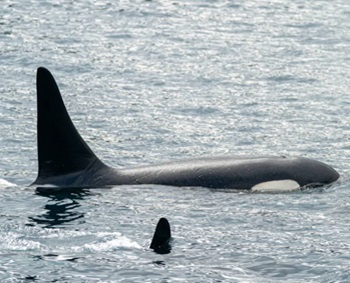 Six killer whales caught in trawl net gear this year in waters off Alaska died as a result of their entanglement, while a seventh whale was seriously injured by this gear, according to a NOAA Fisheries statement released Friday. The trawl fishing industry’s 2023 take of killer whales, first made by public NOAA Fisheries in September, is significantly higher than in recent years past, according to a review of NOAA Fisheries death tolls through 2021. Bering Sea killer whales are not listed under the Endangered Species Act but are protected under the Marine Mammal Protection Act. John Gauvin, fisheries science director for the Alaska Seafood Cooperative, “We want to conduct our fisheries without harming orcas and we’re taking steps to avoid future mortalities,” more, >>click to read<< 10:19
Six killer whales caught in trawl net gear this year in waters off Alaska died as a result of their entanglement, while a seventh whale was seriously injured by this gear, according to a NOAA Fisheries statement released Friday. The trawl fishing industry’s 2023 take of killer whales, first made by public NOAA Fisheries in September, is significantly higher than in recent years past, according to a review of NOAA Fisheries death tolls through 2021. Bering Sea killer whales are not listed under the Endangered Species Act but are protected under the Marine Mammal Protection Act. John Gauvin, fisheries science director for the Alaska Seafood Cooperative, “We want to conduct our fisheries without harming orcas and we’re taking steps to avoid future mortalities,” more, >>click to read<< 10:19
Alaska records fourth largest salmon harvest with economic blow
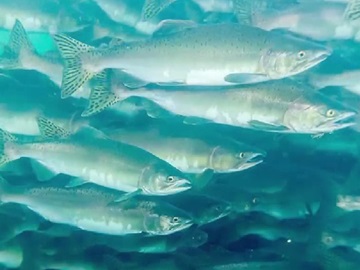 2023 marks the fourth largest salmon harvest since the Alaska Dept. of Fish & Game started to record the harvest in 1985. Unfortunately, the large harvest did not bring in financial scores equal to smaller harvests. Last year, the overall salmon harvest for the state of Alaska wasn’t the largest on record, but it was the largest harvest of sockeye. For 2023, pink salmon claimed dominance and the overall harvest was massive as well, but the revenue fell far from the gains seen last year. In 2023, the harvest numbers were a major success for the fishing industry bringing in a total of over 230 million salmon. That’s the fourth largest harvest on record, much of it being pink salmon. Video, more, >>click to read<< 17:25
2023 marks the fourth largest salmon harvest since the Alaska Dept. of Fish & Game started to record the harvest in 1985. Unfortunately, the large harvest did not bring in financial scores equal to smaller harvests. Last year, the overall salmon harvest for the state of Alaska wasn’t the largest on record, but it was the largest harvest of sockeye. For 2023, pink salmon claimed dominance and the overall harvest was massive as well, but the revenue fell far from the gains seen last year. In 2023, the harvest numbers were a major success for the fishing industry bringing in a total of over 230 million salmon. That’s the fourth largest harvest on record, much of it being pink salmon. Video, more, >>click to read<< 17:25
Opinion: The tragic mismanagement of bycatch in Alaska
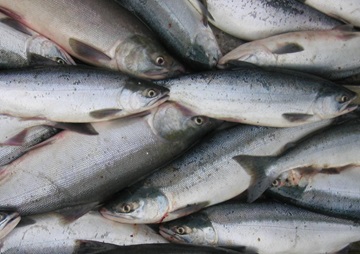 The commissioner of the Alaska Department of Fish & Game’s recent opinion piece on bycatch would make for good comedy if the topic wasn’t so serious. Doug Vincent-Lang extolled the North Pacific Fishery Management Council’s handling of bycatch in trawl fisheries off the coast of Alaska. As examples, he mentioned existing bycatch caps for chinook salmon and halibut bycatch measures that are not yet in effect. Other than that, here are the council “actions” he espouses. The council, of which he is a key member, has “initiated an analysis” concerning caps on chum bycatch, is “considering further fishing restrictions” related to crab in the Bering Sea and is “evaluating whether further protections are needed” for Tanner crab in the Gulf. He also notes that the council “support(s) further research” into the causes of the declines in these seminal Alaska fisheries stocks. >>click to read<< 12:29
The commissioner of the Alaska Department of Fish & Game’s recent opinion piece on bycatch would make for good comedy if the topic wasn’t so serious. Doug Vincent-Lang extolled the North Pacific Fishery Management Council’s handling of bycatch in trawl fisheries off the coast of Alaska. As examples, he mentioned existing bycatch caps for chinook salmon and halibut bycatch measures that are not yet in effect. Other than that, here are the council “actions” he espouses. The council, of which he is a key member, has “initiated an analysis” concerning caps on chum bycatch, is “considering further fishing restrictions” related to crab in the Bering Sea and is “evaluating whether further protections are needed” for Tanner crab in the Gulf. He also notes that the council “support(s) further research” into the causes of the declines in these seminal Alaska fisheries stocks. >>click to read<< 12:29
‘People helping people’
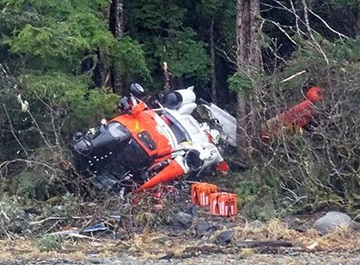 Some folks in Alaska are going to be very thankful on Thanksgiving. The Lydia Marie, a 44-foot wooden troller, with its captain, Logan Padgett, and his brother aboard, began taking on water on Nov. 13 while in rough waters in Frederick Sound, KCAW.org reported. Padgett sent out a mayday to U.S. Coast Guard Air Station Sitka and headed for calmer waters off Read Island in Farragut Bay. The flooding got under control, but the helicopter was already on the way. “Well, it was dark,” Padgett said. “So we were just looking at the helicopter lights, and there wasn’t really much to see. But we could hear the rotors one second, and then (a) loud crash the next. Then silence.” >>click to read<< 06:53
Some folks in Alaska are going to be very thankful on Thanksgiving. The Lydia Marie, a 44-foot wooden troller, with its captain, Logan Padgett, and his brother aboard, began taking on water on Nov. 13 while in rough waters in Frederick Sound, KCAW.org reported. Padgett sent out a mayday to U.S. Coast Guard Air Station Sitka and headed for calmer waters off Read Island in Farragut Bay. The flooding got under control, but the helicopter was already on the way. “Well, it was dark,” Padgett said. “So we were just looking at the helicopter lights, and there wasn’t really much to see. But we could hear the rotors one second, and then (a) loud crash the next. Then silence.” >>click to read<< 06:53
When a Coast Guard helicopter crashed in Southeast Alaska, first on the scene were the helicopter crashed it came to rescue
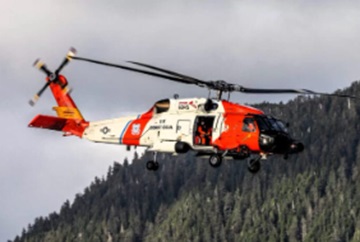 The first people at the scene of Monday night’s crash of an Air Station Sitka helicopter were the crew of the distressed fishing vessel it was sent to assist. The two brothers aboard the Lydia Marie played a critical role in the rescue of the downed air crew. Logan Padgett is the captain of the Lydia Marie, a 44-foot wooden troller based in Wrangell. The Lydia Marie began taking on water around 8 p.m. Monday in the rough seas of Frederick Sound. Padgett sent out a mayday and steered for the protected northern shore of Read Island in Farragut Bay. >>click to read<< 08:05
The first people at the scene of Monday night’s crash of an Air Station Sitka helicopter were the crew of the distressed fishing vessel it was sent to assist. The two brothers aboard the Lydia Marie played a critical role in the rescue of the downed air crew. Logan Padgett is the captain of the Lydia Marie, a 44-foot wooden troller based in Wrangell. The Lydia Marie began taking on water around 8 p.m. Monday in the rough seas of Frederick Sound. Padgett sent out a mayday and steered for the protected northern shore of Read Island in Farragut Bay. >>click to read<< 08:05
Ordinary Heroes: Fishermen Turn Rescuers in Treacherous Seas – In the midst of a treacherous night at sea, the crew of the fishing vessel Lydia Marie found themselves unexpectedly shifting roles from the ones in need of rescue to becoming the rescuers. Captain Logan Padgett and his younger brother, ordinary fishermen, were thrust into action to aid the downed air crew of an Air Station Sitka helicopter. >>click to read<< 11:24
Kongsberg Discovery Partners with Arctic Storm for Advanced US-built Trawler-processor
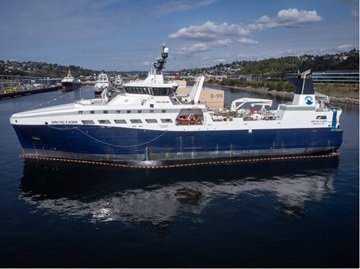 The first US-built trawler-processor for Alaskan pollock in over three decades is now undergoing sea trials in the Northern Pacific, testing an integrated technology package from Kongsberg Discovery tailored to locate, inspect, and engage fish with unparalleled efficiency. The 100-meter-long Arctic Fjord, designed by Kongsberg Maritime and built by Louisiana’s Thoma-Sea Marine Constructor, will start full-time operations for 2024’s pollock A season in the Bering Sea. “The Arctic Fjord sets a new benchmark for the Alaskan pollock fleet,” Woodruff comments. “From its fuel-efficient design to the outstanding crew accommodation and state-of-the-art onboard processing facilities, every element has been cherry picked to not just do the job, but to do it to the highest possible standards. >>click to read<< 09:50
The first US-built trawler-processor for Alaskan pollock in over three decades is now undergoing sea trials in the Northern Pacific, testing an integrated technology package from Kongsberg Discovery tailored to locate, inspect, and engage fish with unparalleled efficiency. The 100-meter-long Arctic Fjord, designed by Kongsberg Maritime and built by Louisiana’s Thoma-Sea Marine Constructor, will start full-time operations for 2024’s pollock A season in the Bering Sea. “The Arctic Fjord sets a new benchmark for the Alaskan pollock fleet,” Woodruff comments. “From its fuel-efficient design to the outstanding crew accommodation and state-of-the-art onboard processing facilities, every element has been cherry picked to not just do the job, but to do it to the highest possible standards. >>click to read<< 09:50
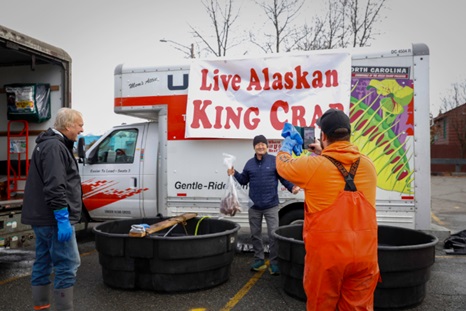
Alaska crabbers get creative with pop-up sales, but industry’s fate uncertain
With Alaska’s Bering Sea snow crab fishery shut down for the second year in a row, crabbers are having to make tough decisions and find creative ways to earn income, like selling direct to Anchorage consumers, sometimes in parking lots. A hand-painted sign on an Anchorage street corner and a hanging sign with the words “Live Alaskan King Crab” were enough to draw in customers to a Spenard parking lot that had become home to one of the shellfish pop-up sales. The live crab sale was in its fourth day on Nov. 2 and had already sold more than three-quarters of the 700 red king crabs hauled out from the Bering Sea. In an attempt to make up some lost income, third-generation fisherman Gabriel Prout brought red king crab to Anchorage to sell directly to consumers. Photos, >>click to read<< 09:16






